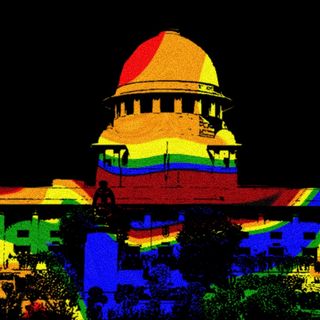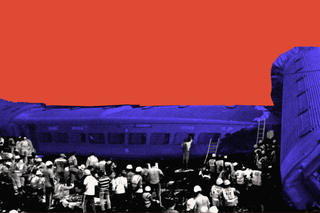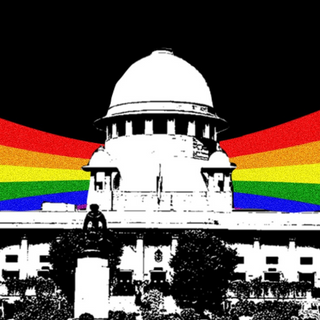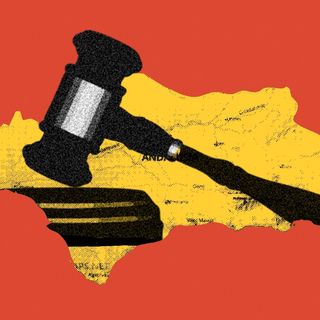
Who Takes the Fall for the Decade’s Worst Train Disaster in India?
The bigoted narratives furthering casteism and Islamophobia on social media are exploiting a national tragedy that killed hundreds.

Odisha’s train collision on Friday evening — killing close to 300 people and injuring more than a thousand — has been classified as one of the worst train disasters in India. The crash involved three trains: the Bengaluru-Howrah Superfast Express, the Shalimar-Chennai Central Coromandel Express, and a goods train. A preliminary report indicates that the accident was the result of signal failure, leading to an inquiry concerning railway safety in India. However, the fact is that this was not a one-off accident. 11,900 passengers were killed and 11,100 injured in 2020 alone, which points to a systemic problem.
Yet, conversations around the disaster continue to revolve around blaming the driver, pointing out overcrowding in compartments, and condemning reservations in railways employment, which imply that individuals — especially marginalized ones — are at fault. Besides shedding light on how precarious safety on board an Indian train is, the tragic accident has provided a platform for bigoted netizens to propagate hate speech and prejudice, with social media accounts insinuating that the country’s Muslim population orchestrated the strike. Yet others are blaming India’s reservation policy for the accident, implying that officials from marginalized communities aren’t equipped to do their job and have, somehow, contributed to the accident thus. The narratives disregard the complex causes of the crash, perpetuating casteist and Islamophobic biases.
These biases persist despite researchers explaining that that affirmative action policies, such as reservations, do not hinder the efficiency or productivity of the railways, and fact-checkers confirming that the building adjacent to the site of the crash is a temple, and not a mosque, as claimed by the spreaders of misinformation.
The fourth largest national railway system in the world, by size, and the largest public sector undertaking in India, the railways are often dubbed as the “lifeline of the nation.” But India’s railway system was established during British colonial rule and requires substantial modernization to meet the growing demands of a rapidly developing nation. According to a recent report, the railways has been plagued by frequent accidents, attributed to track defects, maintenance issues, outdated signaling equipment, and human errors — resulting in more than 100,000 train-related deaths in India between 2017 and 2021. The report concluded that 26% of the accidents could have been avoided if track restoration wasn’t grossly underfunded or available funds weren’t being underutilized. Besides, insufficient staffing is also likely to have hindered necessary upgrades and maintenance efforts, as many are pointing out.
While the government has announced plans for extensive upgrades, implementation remains a challenge, and many improvements are years away. “The Modi government has made no secret of its fascination for big plans aimed at the modernisation of Indian Railways — be it the high-profile but delayed bullet train project between Mumbai and Ahmedabad, the commissioning of hydrogen-fuelled Vande Metro or the introduction of modern and semi-high speed, premium trains like Vande Bharat Express, Tejas Express, and Humsafar Express, touching a speed of 160 kmph,” Rakesh Joshi, the executive editor at Business India. wrote this January, arguing, “Running fast or semi-fast trains is one thing, ensuring safety is another.” Arguably, in the frenzy to launch expensive high-speed trains that are accessible only to a few but will garner national and international acclaim for “developing” the country, the failure lay in prioritizing infrastructure for the elite rather than improving existing infrastructure for the majority.
Related on The Swaddle:
What Is the Role of a Bystander in Gender‑Based Violence?
This isn’t to say that the railways is an overlooked sector. The government does care about the railways, and its efforts cannot be completely disregarded. But trending #StandWithAshwiniYadav on social media, in a bid to shield the railway minister from criticism, and lionize him for visiting the site of the crash — arguably, to do his job — feels like a bit of an overreaction, especially since it takes attention away from acknowledging the need for continued action to address systemic deficiencies in the railways.
“[I]n any modernisation process, safety has to be paramount… Currently, the Railways does not have any of [the] modern flaw detection systems and totally depends on manually operated ultrasound detection machines. There were at least 35 derailment cases during 2022 and an equal number of cases were reported in the previous year as well. Moreover, a total of 55 derailment[s were] reported [between] 2019 [and] 2020, due to track defects,” Joshi continued.
Meanwhile, the bigoted narratives being circulated to further casteist and Islamophobic agenda aren’t just exploiting a national tragedy that has destroyed and debilitated the lives of a thousand Indians, at the very least. It is also diverting energy and resources from investigating the root cause of the accident and rehabilitating the injured, to combating online hate. “It has come to notice that some social media handles are mischievously giving communal colour to the tragic train accident at Balasore,” the official account of the Odisha Police was compelled to tweet amid the ongoing probe into the crash. “We appeal to all concerned to desist from circulating such false and ill-motivated posts. Severe legal action will be initiated against those who are trying to create communal disharmony by spreading rumours.”
Irrespective of who — or, perhaps, what — is at fault, the fact remains that hundreds of people have paid the price for it with their lives. Compensation aside, this warrants an objective examination of the systemic failures within India’s railway network.
It is only by recognizing the systemic challenges and working toward comprehensive reforms that India can strive to create a safer railway system for all its citizens.
Devrupa Rakshit is an Associate Editor at The Swaddle. She is a lawyer by education, a poet by accident, a painter by shaukh, and autistic by birth. You can find her on Instagram @devruparakshit.
Related


The Marriage Equality Hearings Week 3: Is Marriage a Fundamental Right?
